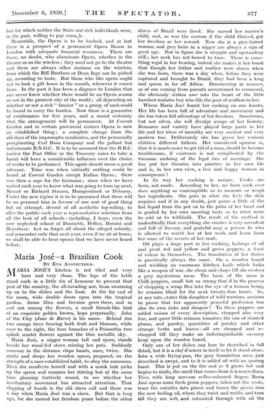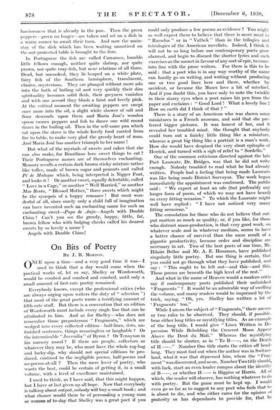Maria Jose—a Brazilian Cook
BY EVA ANSTRUTHER.
.N/FARIA JOSE'S kitchen is red tiled and very -I-YX bare and very clean. The legs of the table stand each in a little tin of kerosene to prevent that pest of the country, the all-invading ant, from swarming up on to the dishes and the food. At the far end of the room, wide double doors open into the tropical garden.. Arum lilies and freezias grow there, and in and out among the flowers, a small thrush-like bird of an exquisite golden brown, hops perpetually. John of the Clay (Joao de Barro) is his name. Behind rise two orange trees bearing both fruit and blossom, while over to the right, the bare branches of a Poinsettia tree splash scarlet flowers against the blue metallic sky.
Maria Jose, a nigger woman tall and spare, stands beside her wood-fed stove stirring her pots. Suddenly someone in the distance claps hands, once, twice. She starts and drops her wooden spoon, prepared, on the strength of a once established habit, to obey the summons. Then she recollects herself and with a Quick jerk picks up the spoon and resumes her stirring but at the same time glancing furtively round, to see whether her involuntary movement has attracted attention. That clapping of hands is the old slave call and there was a day when Maria Jose was a slave. But that is long ago, for she earned her freedom years before the other slaves of Brazil were freed. She nursed her master's child, and, as was the custom if the child thrived, got her freedom as her reward. Now she is a grey-haired woman, and grey hairs in a nigger are always a sign of great age. But in figure she is straight and upstanding still ; her neck has not bowed to time. There is some- thing regal in her bearing, indeed she makes it her boast that though her father and mother were slaves when she was born, there was a day when, before they were captured and brought to Brazil, they had been a king and queen in far off Africa. Domineering in manner, as of one coming from parents accustomed to command, she obviously strikes awe into the heart of the little barefoot mulatto boy who fills the post of scullion to her.
Where Maria Jose learnt her cooking no one knows. Her life has been full of adventure and movement and she has taken full advantage of her freedom. Sometimes, but not often, she will divulge scraps of her history. Romance and variety have played large parts in her life and her ideas of morality are very ancient and very modern too. Deliberately she has given her various children different fathers. Her considered opinion is, that it is much easier to get rid of a man, should he become troublesome, if existence is not complicated by the tiresome undoing of the legal ties of marriage. Shc has put her theories into practice in her own life and is, in her own view, a free and happy woman in consequence !
In its way her cooking is unique. Cooks are born, not made. According to her, no born cook ever does anything so contemptible as to measure or weigh her ingredients. She puts in what she feels the dish requires and if in any doubt, just pours a little of the hot liquid from the pot on to the palm of her hand and is guided by her own unerring taste as to what more to add or to withhold. The result of the method is undoubtedly that everything she creates is very succulent and full of flavour, and grateful may a person be who is allowed to watch her at her work and learn from her some of the secrets of her craft.
Oil plays a large part in her cooking, lashings of oil and great red and yellow and green peppers, a feast of colour in themselves. The foundation of her dishes is practically always the same. On a wooden board and wielding an enormous kitchen knife which looks like a weapon of war, she chops and chops till she evolves a grey mysterious mess. The basis of the mess is Chili peppers, small but so strong that if in the process of chopping a scrap flies into the eye of a human being, he remains blind for the next twenty-four hours. So, at any rate, states this daughter of wild warriors, anxious to prove that her apparently peaceful profession has also its own risks and dangers I To these peppers are added onions of every description, chopped also very fine, and queer little crimson tomatoes the size of stunted plums, and parsley, quantities of parsley and other strange herbs and leaves—all are chopped and re- chopped till they make an indistinguishable savoury heap upon the wooden board.
Only one of her dishes can here be described in full detail, but it is a chef d'oeuvre in itself so let it stand alone. Into a wide frying-pan, the grey foundation mess just described is swept, and to it is added oil with no sparing hand. This is put on the fire and as it grows hot and begins to sizzle, the smell that comes from it is marvellous. Then with long nervous coffee-coloured fingers Maria Jose opens some fresh green peppers, takes out the seeds, tears the outsides into pieces and tosses the pieces into the now boiling oil, where they twist and writhe and turn till they are soft, and saturated through with all the lusciousness that is already in the pan.. Then the green peppers—green no longer—are taken and set on a dish in a warm corner to await their turn. And now the main- stay of the dish which has been waiting unnoticed on the ant-protected table is brought to the fore.
In Portuguese the fish are called Camaroes, humble little fellows enough, neither quite shrimp, nor quite prawn, nor quite cray-fish, but near relations of all three. Dead, but uncooked, they lie heaped on a white plate, fairy fish of the Southern hemisphere, translucent, elusive, mysterious. They are plunged without more ado into the bath of boiling oil and very quickly their dim spirituality becomes solid flesh, their greyness vanishes and with one accord they blush a faint and lovely pink. At the critical moment the awaiting peppers are swept once more into the oil, a slight white shower of salt and flour descends upon them and Maria Jose's wooden spoon causes peppers and fish to dance one wild round dance in the boiling oil. Then in the self-same pan which sat upon the stove is the whole lovely food carried from fire to table, to make very glad the greedy heart of man. And Maria Jose has another triumph to her name !
But what of the myriads of sweets and cakes that she can also make, for Brazilians love sweet things to eat ? Their Portuguese names are of themselves enchanting. Memory recalls a certain dark brown sticky mixture rather like toffee, made of brown sugar and peanuts and called N de Muleque which, being interpreted is Nigger Foot, and looks it ! Or another sweet, equally delectable, called " Love in a Cage," or another " Well Married," or another Mae Rente, " Blessed Mother," three sweets which might be the synopsis of a happy romance ! But most won- derful of all, since surely only a child full of imagination can have invented such an enchanting name for such an enchanting sweet —Papa de Anjo—Angels with Double Chins Can't you see the greedy, happy, little, fat, brown fellow who with bulging cheeks called his dearest sweets by so lovely a name ?
Angels with Double Chins!



























































 Previous page
Previous page